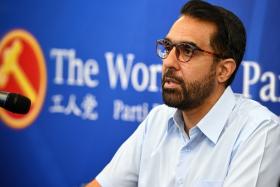Police given more muscle to handle terror attacks
Parliament passes Bill after robust debate, as MPs raise concerns over possible abuse of enhanced powers
Recording images in a terror attack and other serious incidents will become illegal when the Public Order and Safety (Special Powers) Bill, or Posspa, becomes law.
Parliament passed the Bill yesterday after a robust three-hour debate during which several MPs voiced concerns.
During the second reading of the Bill, Second Minister for Home Affairs Josephine Teo said Posspa will ensure that the police have "necessary powers to be able to deal effectively with serious incidents such as a terrorist attack".
Under the new law, a communications stop order (CSO) can be invoked by the commissioner of police when authorised by the home affairs minister.
This will stop people, including journalists and the public, from making or communicating images of the incident area for a period.
Communicating text or audio messages about ongoing security operations will also be outlawed.
Offenders can be fined up to $20,000 and/or jailed up to two years.
The police can also take down or disable any unmanned aircraft and autonomous vehicles, as well as vehicles in and around the incident area.
Posspa will also enable the police to direct building owners in the incident area to take certain actions and provide police with helpful information.
They can also question people in the incident area to obtain information.
USE OF POSSPA AGAINST PEACEFUL PROTESTS?
Several MPs, including Ms Sylvia Lim (Aljunied GRC) and Mr Louis Ng (Nee Soon GRC), asked why powers dealing with terrorism are the same for large-scale public disorders.
They were concerned that the definition of a "serious incident" under Posspa could lead to its use against peaceful protests.
Mrs Teo clarified that peaceful protests were not the target of Posspa, which will be invoked only if there is "large-scale public disorder or violence becomes imminent".
She added: "There must be significant disruption to ordinary Singaporeans trying to go about their daily business."
ENFORCEMENT OF CSO
Mr Henry Kwek (Nee Soon GRC) and Mr Ng asked if the CSO would stop those embroiled in an incident, such as hostages, from updating their loved ones.
Mrs Teo said this is not its intention as it is meant to stop "irresponsible communication".
The police will consider the circumstances of anyone reported to have breached the CSO.
Other MPs, including Ms Lim, Mr Gan Thiam Poh (Ang Mo Kio GRC) and Nominated MP K. Thanaletchimi, raised concerns that the CSO may discourage people from giving information to the police.
Mrs Teo said action will not be taken against anyone who acts "in good faith" when recording during a CSO.
The police will also grant select media access to incident locations for later coverage.
Ms Lim said the inability to record images during an incident would make it difficult to make any complaint against the authorities afterwards.
Mrs Teo said investigations into such matters "do not start and end with photo or video evidence" as evidence can be gathered by other means too.
On the rationale for a blanket ban on recording of images during the CSO, Mrs Teo said that during a serious incident, the police would not have time to check every individual recording to ascertain their intentions.
FOR MORE, READ THE STRAITS TIMES TODAY
Get The New Paper on your phone with the free TNP app. Download from the Apple App Store or Google Play Store now



